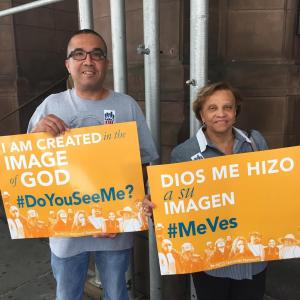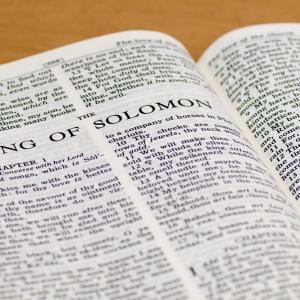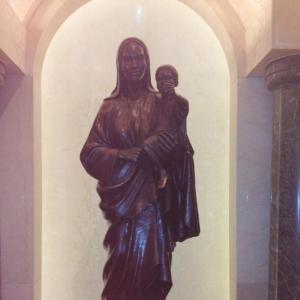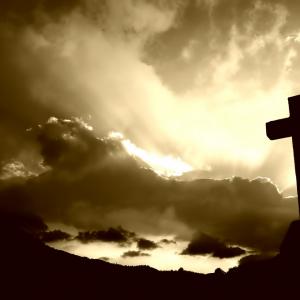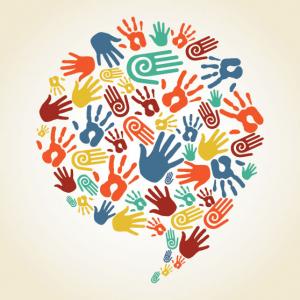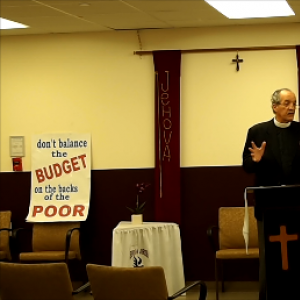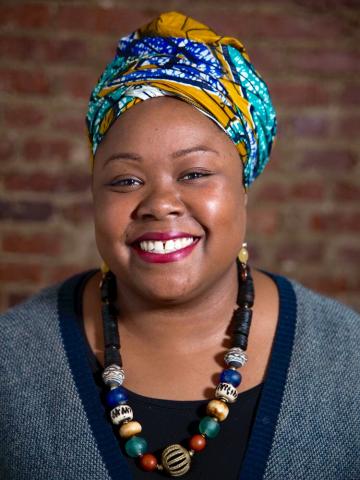
Minister Onleilove (pronounced Onlylove) Chika Alston, Founder of Prophetic Whirlwind was born and raised in East New York, Brooklyn. Currently she is the Founder of Her Wisdom Consulting and the former executive director at PICO-Faith in New York, where she leads a multiracial and multifaith organizing federation of 70+ congregations representing 80,000 New Yorkers who are working to Build the Beloved City — where all of God’s children can live in dignity. Onleilove is also a community organizer, speaker, and writer. After receiving her bachelor’s degree in Human Development with a minor in African-American studies from Penn State University, she completed a year of service with AmeriCorps Public Allies New York. In 2011, she received her Master of Divinity and Master of Social Work degrees from Union Theological Seminary and Columbia University School of Social Work, respectively.
Her writing has been featured in Sojourners magazine, Huff Post Religion, The Black Commentator, and NPR’s On Being blog, as well as in other print and online publications. Having experienced poverty and homelessness, she has developed a compassion for people fueled by her passion for justice, and knows that the gospel is truly “good news to the poor.” She has completed The Collegeville Institute Fellowship and the FPWA Faith and Justice Fellows Program. Onleilove writes and lectures on the implicit bias of colorism and its impact on African-American women; leading A Women’s Theology of Liberation and Live Free W.O.M.B. (Women Organizing Out of Mass Incarceration and Brutality) for the PICO Network. In 2016 Onleilove testified before the United Nations Working Group for People of African Descent Testimony on Mass Incarceration’s Impact on Black Women & Girls. She has been a featured speaker and workshop facilitator at CCDA, Dartmouth College, Why Christian, Sojourners' Summit, The 2015 African Hebrew Conference in Israel, and The Samuel Dewitt Proctor Conference among other conferences, congregations, and organizations. For her writing and activism work, Onleilove has received the Public Allies New York Local Alumni Award, The Lost Angels Society Survivor Award, The Bennett Fellowship for Social Justice from Auburn Seminary, the National Association of Social Workers-NYC Scholarship for Social Justice, United Food and Commercial Workers International Union Minority Coalition Young Adult Award, and the 2011 Evangelical Press Association’s Student Writer of the Year First Place Award for her Sojourners cover story: “Dethroning King Coal: Christians defend a way of life, and the earth, in Appalachia.” She is one of a few African-Americans that have visited and ministered among Jews in Africa and her first book on her research into these communities is Prophetic Whirlwind: Uncovering the Black Biblical Destiny. Onleilove has five siblings and a large extended family. She worships and serves as a Minister of Evangelism at Beth-El The House of Yahweh where she serves as a Minister of Evangelism and is an active member of Inner City Light House. To learn more visit: PropheticWhirlwind.com. For everything she has accomplished Chika says To Yah Be The Glory!
Posts By This Author
Sojourners in a Strange Land
Sincere love during these times means offering sanctuary for the sojourner, risking our congregations, and even putting our bodies on the line — knowing that our true citizenship is in the Kingdom, where no one is illegal and all are loved.
Through Chaos, Bring Shalom

Image via AuKirk/Shutterstock.com
I know this election cycle has brought out the worst in our country and that many of us may be anxious about what will happen the days following the election. But remember, whatever chaos ensues — we are empowered as people of faith by the Most High God to be agents of justice. This is a divine opportunity for us to show up in the public square as prophets of shalom.
How to Pray in an Age of Police Violence
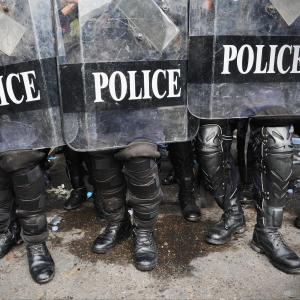
Image via 1000 Words / Shutterstock.com
As I looked through my Facebook newsfeed I saw many of my African-American friends asking, “How long, oh Lord?” This question is not just one we asked after Alton Sterling and Philando Castile were added to our great cloud of witnesses as the latest victims of racial violence, but this is a question our parents, grandparents, and generations have asked as they faced oppression.
'Barbershop: The Next Cut' — Use What God Placed in Your Hands and Laugh Along the Way
My love for comedy and the communal spaces that black barber and beauty shops offer was the reason why I had to see Barber Shop: The Next Cut with some of my friends last Saturday night in New York City. As promised, the controversial jokes abounded, and we laughed, but my friends and I were also challenged by seeing the characters use what was in their hands (Exodus 4:2) — their hair care skills and the space of a small black-owned business — to respond to gang violence in Chicago.
The First Baby Shower Unites Women on the Margins
Sculpture of Mary and Elizabeth and Church of the Visitation in Jerusalem. Creative Commons license.
In America, baby showers are times for women to come together and celebrate new life; presents are exchanged, advice given, and games played. Mary and Elizabeth celebrated the new life within them by exchanging presents of joy, encouragement, song, and prophecy. Both women were carrying children of promise. Neither woman had a convenient pregnancy. Mary and Elizabeth’s celebration shows the importance of women coming together for prayer, praise, and prophecy.
#ThePopeinNYC: 'Let Us Be Prophets of Peace'
Pope Francis touched down at John F. Kennedy International Airport on Sept. 24, but New Yorkers of all faith traditions eagerly awaited his prophetic message of justice for months.
As the Executive Director of Faith in New York, an interfaith community organizing federation of over 70 congregations representing 80,000 families of faith throughout New York City, I believe the pope’s message is an exclamation point to our justice work. Faith in New York is a part of the PICO National Network and as a network we are undergoing A Year of Encounter with Pope Francis, inviting congregations to host small group discussions using our 7-week curriculum focused on immigration, mass incarceration, climate justice, and race and inspired by The Joy of the Gospel, Pope Francis’ first apostolic exhortation. The small groups remind me of the Christian base communities that gave birth to liberation theology in South America. Through these small, interactive groups we hope to remind people of faith throughout America that social justice is not an afterthought to our faith but an integral part of expressing it.
Is Dark Skin A Sin?
I am black, but [AND] comely, O ye daughters of Jerusalem, as the tents of Kedar, as the curtains of Solomon. Look not upon me, because I am black, because the sun hath looked upon me: my mother's children were angry with me; they made me the keeper of the vineyards; but mine own vineyard have I not kept. Song of Songs 1: 5-6
As the Executive Director for Faith in New York, an affiliate of the PICO National Network, I organize faith communities to take action for justice concerning issues that threaten the health of our communities. One of our campaigns is Live Free New York, which is a part of a national movement in which people of faith are working to end mass incarceration, gun violence, and police brutality through policy change and direct action.
Mass incarceration is an issue with many tentacles, and in New York, one tentacle is school suspension rates that are through the roof for black children. What many in the black community don’t understand is that according to data from the Office for Civil Rights at the U.S. Department of Education, as presented in a recent New York Times article: “black girls in public elementary and secondary schools nationwide are suspended at a rate of 12 percent compared with a rate of just 2 percent for white girls and more than girls of any race or ethnicity. … An analysis by Villanova [University] researchers of data from the National Longitudinal Surveys of Youth and the National Longitudinal Study of Adolescent Health indicated that black girls with the darkest skin tones were three times more likely to be suspended than black girls with the lightest skin.”
'We Are Not an Island'
MARQUETTA L. GOODWINE, a computer scientist, mathematician, and community organizer, grew up on the Sea Islands off the coast of South Carolina. On July 2, 2000, Goodwine was “enstooled,” in a traditional African ceremony, as “Queen Quet,” political and spiritual leader of the Gullah/Geechee Nation that extends from coastal North Carolina to Jacksonville, Fla.
“A lot of people don’t know that we exist,” she told Sojourners. “People are unaware that there is a subgroup of the African-American community that’s an ethnic group unto itself, with nationhood status for itself.”
Queen Quet, and the Gullah/Geechee Sea Island Coalition she founded, are actively engaged in battling environmental racism and climate change. As a cultural leader of an Indigenous community, she works to preserve her people’s heritage in the land and stop corporate encroachment. As a spiritual leader of a people who practice a unique form of faith that adheres to Christian doctrine while being distinctly African, she nurtures her people’s tradition of communal prayer, song, and dance, as well as their connection to Praise Houses, the small places of worship built on plantations during slavery.
Sojourners contributing writer Onleilove Alston, lead organizer in Brooklyn for Faith in New York, a member of the PICO National Network, sat down with Queen Quet on St. Helena Island in Beaufort County, South Carolina, to learn more about the Gullah/Geechee people, their spirit, and their struggle for justice. —The Editors
THE GULLAH/GEECHEE PEOPLE are the descendants of African people that were enslaved on the Sea Islands. We are descendants of Igbo, Yoruba, Mende, Mandinka, Malinke, Gola, Ife, and other ethnic groups from the Windward Coast of Africa, as well as Angola and Madagascar.
We also have Indigenous American ancestry from the Cusabo, Yamasee, Cree, and Edistow, the original inhabitants of the land now held in the Gullah/Geechee Nation. A socio-anthropologist segregated us at one point, saying that Gullahs are on the South Carolina Sea Islands and Geechees are on the Georgia Sea Islands, but there is no difference between us. We are one people.
In 1999, I became the first Gullah/Geechee in history to speak before the United Nations. Now I am a member of the International Human Rights Association of American Minorities, an NGO with U.N. consultative status, and the International Human Rights Council (a coalition of human rights scholars and activists that works on key human rights issues).
The Black Presence in the Bible: Uncovering the Hidden Ones
Are Black people mentioned in the Bible? Absolutely. The Bible is a multicultural book. This statement may sound controversial but archeology, history, and the text prove it to be true. It may be difficult to see the black presence in the Bible because you won’t read the terms black or African but you will read the terms Ethiopians, Cushites, Egyptians, and other tribal terms. The Roman Catacombs show biblical scenes painted by first- and second-century persecuted Christians, and their paintings clearly show people of color. What would Roman Christians gain from painting these characters black? What did these early Christians know and accept that seems unbelievable today? It appears that our faith has been distorted. One of the effects of racism is the whitewashing of history and sadly this has taken place even in our biblical studies.
'Ninety-Nine and a Half (Won't Do)'
Summertime is "revival season" for Christians of various denominations. Traditionally revivals, or "Great Awakenings", have preceded most major movements in American society, like the Revolutionary War and the Civil War. Revival involves not only a supernatural outpouring of the Holy Spirit but an intense time of confession, repentance, and crying out to God to make us and our communities right.
This summer will mark two major Civil Rights anniversaries: the 50th Anniversary of the March on Washington and 58th Anniversary of Emmitt Till’s death. It is my belief that providence provides us with divine appointments that can be overlooked as coincidences if we do not have the spiritual eyes to see. This summer appears to be one of those times of divine appointment.
The American Church has never truly mourned and repented of its original sin of racism, and sadly this sin has infected the Body of Yahshua (Christ) globally.
A Caution in Pursuing the Common Good
Whenever I hear the term Common Good I think of Thomas Paine’s infamous pamphlet Common Sense,which challenged the British government and the royal monarchy, but did not challenge the institution of slavery. As an African-American woman I enter the Common Good conversation cautiously because I know that in our society we have a habit of taking what is good for Western hegemony and making it the standard for everyone else.
As we pursue the Common Good, let us remember what was once considered common and good during earlier points in American history: chattel slavery, indigenous genocide, and institutionalized sexism. To truly come to a Common Good, we need to honor a diversity of voices and challenge our assumptions about what is common and what is good. Our default is to take what is good for our culture, gender, or community and make it the common standard for all. I have experienced being invited into organizations that were aiming to do good in the world, but an expectation existed that I would be silent about my unique concerns as an African woman. I know that denying my reality can never be good for my spiritual, physical, or social well being.
Connecting the Dots
OVER THE PAST few years, we have seen tangible proof that creation is terribly off balance. Global warming is causing droughts and heat waves around the world and is making hurricanes more powerful. In my hometown of New York City, we have experienced the effects of severe weather: Hurricane Irene in 2011 and, most recently, the devastation of Hurricane Sandy. Sandy was an eye-opening demonstration that climate change is a poverty issue, a race issue, and an immigration issue.
Though neighborhoods of all socioeconomic statuses were affected by Sandy, poorer communities are taking longer to recover. Many of them were without electricity, heat, and water longer than were more affluent communities. For instance, residents of Red Hook's public housing projects in Brooklyn were without power and water for two weeks after the storm. My cousin Dabriah Alston, a Red Hook resident, told me that the city ignored residents' repeated requests for information about when the heat would come back on: "The bottom line is, they don't care about us. Projects are filled with poor folk, and as we all know, the poor are seldom a priority."
Hurricane Sandy shone an uncomfortable light on racial and economic disparity in New York City. As someone who was born and raised in Brooklyn, I am very familiar with Red Hook's history of poverty, and the neglect by local government. For example, only when the community near the housing projects began to gentrify did the city start to repair the nearby subway station.
Sandy also exposed how, in the city that is home to Ellis Island, immigrants live in an environment of fear. Although families of mixed immigration status qualify for some FEMA disaster assistance, and families of any status qualify for emergency food aid, many did not apply for it because they feared deportation, as I learned at a post-Sandy meeting of the Occupy Faith group. The environment of fear magnified the impact that the hurricane had already had on the poor: Many immigrants are non-salaried workers who missed a week of their already-low wages due to the hurricane.
Let the Little Children Come: Why Childcare is a Faith Issue
As the Faith Based Organizer for the Federation of Protestant Welfare Agencies (FPWA) — a citywide coalition of more than 300 member agencies and faith institutions — I have the privilege of working with a diverse group of faith leaders. Last spring we were thrust into an important struggle for childcare and after school funding led by the Campaign for Children (C4C), a citywide coalition of organizations advocating for childcare and after school funding. Some may wonder why clergy would be concerned about this issue, but for the clergy I work with, the reason is clear: budgets are moral documents, and what is funded reflects our values. Our clergy know that children are the greatest in God’s kingdom and our investment (or lack thereof) in them will have consequences for our future.
In New York City obtaining quality education is a serious struggle for parents of all classes. This struggle includes waiting lists that upperclass parents place their unborn children on, intelligence test for 5 year olds, interviews and hustling from one open house to another. Finding childcare is a daunting task, especially for low-income parents. As a child in New York City I knew how important it was to not end up at my “zone school,” which are schools for children who could not get in anywhere else. Growing up in one of the 12 poorest communities in New York City, my zone schools were the worst. From junior high on I had to take buses and trains to get an education. The process of finding childcare is one of the clearest depictions of the greatest lie that controls New York City: “that some people are worth more than others” (NYFJ Faith Rooted Organizing Core Lie Exercise March 2011).
From Homeless to Hope: Sydia Simmons
At 14 years old, Sydia Simmons was kicked out into the streets of New York City by her alcoholic mother, but today she is a wife, mother, and founder of the Lost Angels Society.
The purpose of the Lost Angels Society is to provide a safe space for homeless teens. Sydia knows firsthand the difficulty of being homeless, especially in New York City, and because she has overcome through her faith she wants to give back.
On Dec. 16, 2012 Sydia hosted the Lost Angels Society Benefit to give homeless youth a Christmas celebration. This benefit was supported by actress Uma Thurman, superstar singer Usher, and many others.
Sydia truly has compassion and a passion for homeless youth, and an important message for the Church. Isaiah 61: 3-4 states: “They will be called oaks of righteousness, a planting of the Lord for the display of his splendor. They will rebuild the ancient ruins and restore the places long devastated; they will renew the ruined cities that have been devastated for generations.” Sydia truly fits the description above because she is rebuilding the lives of teens devastated by homelessness.
Why the Church is the Best Place for a Pussy Riot
On Aug. 17, three members of the Russian feminist punk band/performance art group Pussy Riot received the verdict in the criminal case against them: Guilty of "hooliganism" motivated by "religious hatred." Each was sentenced to two years in prison.
As a faith-based community organizer, I spend a great majority of my time trying to get political issues into the church so that the gospel can be relevant to the reality of those on and off the pews.
Therefore, I believe the best place for a “pussy riot” is the church. Although this may seem sacrilegious, here's why:
1. When the church ignores social and political issues it silently blesses injustice. (See slavery, the Holocaust, lynching, and child sexual abuse.) Testimony Time is a set time in many Black Churches when congregants can speak of their pains and triumphs and how God brought them through.
Testimony time is democratic and a time of raw honesty. I call what Pussy Riot did protestifying because they protested by testifying about the political conditions of their country.
Voices from Human Circles of Protection: New York City
“The problems of homelessness and poverty are not self-inflicted, they are the result of priorities of our society and those priorities are not centered on people but on gathering more wealth for a small number of people. Many of us [homeless people] – despite the stereotypes – drew deeply on our faith and the fact that we’re all children of God and organized ourselves. We’re homeless, not helpless. That’s why our call is to work with us and not for us.”
— Willie Baptist, Scholar-in-Residence The Poverty Initiative at Union Theological Seminary
Join a Circle of Protection on Nov. 16: Standing For and With the Poor
The New York City Human Circle will be replicated throughout across the nation, when faith leaders host Human Circles as members of the Sojourners National Mobilizing Circle, which is bringing together faith and community leaders to organize faith-rooted actions in their communities.
The purpose of these circles is not only to lobby for the poor but also with them.
New York Domestic Workers Call for Rights
University of Puerto Rico Students Strike
Everyone has the right to education. Education shall be free, at least in the elementary and fundamental stages. Elementary education shall be compulsory.


